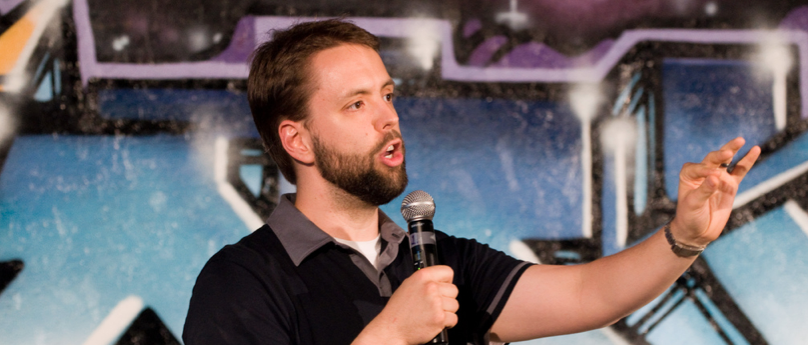Calling all would-be programmers: if you have between 20 and 40 hours a week to spare for the next three to six months, Mike Subelsky will pay you $20 an hour to learn Ruby programming.
But you’ll have to come to Baltimore first, if you’re not already living here.
Subelsky is the CTO of Staq, an advertising-tech startup with offices in Hampden that he cofounded just over a year ago. To accommodate Staq’s recent growth, he’s willing to hire several beginning programmers in temporary positions, start training them in Ruby development, and then put them in charge of building the core components of Staq’s technology, which will involve API development and web-scraping, as he outlined in a blog post announcing the positions.
“Fifteen people have already e-mailed me,” said Subelsky, who mentions in his post that working from Staq’s office will be necessary, at least at the start. As of Tuesday afternoon, he said, one person had already started “unlocking data from different silos using a bunch of cool Ruby technologies.”
Unlocking data is important, because Staq, at its core, is a software-as-a-service product that allows users to manage multiple logins across a variety of display advertising systems from a single dashboard.
- Its main function? To prevent publishers from having to manually create spreadsheets and reports on the effectiveness of display advertising after collating such data from different advertising technology they’re currently using.
- Staq’s main competition? Microsoft Excel.
It’s not exactly something that might impress the girlfriend of the high school football quarterback, and Subelsky readily admits Staq is “less sexy” insofar as business ideas are concerned. But it’s proving to be a viable company.

Since its founding, Subelsky and fellow founder James Curran have built a business that employs eight people full-time (four of them in Baltimore) and raised just north of $1.1 million in seed funding in April. As of May, the startup had six customers and counting, including IDGTech Network, one of Staq’s partners for its beta stage of testing and the owners of PCWorld.com and Macworld.com, among other sites.
“If you’re casting around for an idea, solve a problem businesses had,” said Subelsky, who was a “junior cofounder” of OtherInbox, an e-mail company acquired by Return Path in 2012. “If you just make something incrementally better, you have created something of value.”
With this new paid Ruby programming internship, however, Subelsky is solving a problem for neophyte programmers — collecting enough relevant experience in one coding language to ensure they’re good enough to snag entry-level programming jobs at other tech companies. It’s a “train, don’t complain” approach.
“There isn’t a shortage of developers [in Baltimore],” he said. “There is a shortage of Ruby developers.”
Subelsky likens Staq’s program to a “lite” version of Hungry Academy, a five-month program run by (struggling) D.C.-based daily-deals company LivingSocial that prepares novice programmers for jobs with that company’s engineering team. In addition to the money Staq’s offering, Subelsky is promising “unlimited mentoring and training” from him and Staq’s other programmers. By the end of a person’s three-to-six-month stint at Staq, Subelsky wants to either hire them as a full-time salaried employee, or see that they’re hired by another local software company.
In other words, the program is similar in nature, albeit narrower in scope, to what Hungry Academy does.
And even if the technical and educational requirements for a temporary assignment at Staq don’t call for a college degree in computer science, Subelsky’s new initiative isn’t designed to be a stand-in for such a degree. The inspiration, after all, for Staq’s program came from a University of Maryland, Baltimore County, undergraduate currently working for the startup and studying computer science.
The program is, however, trying to convince people from an “unconventional background” to apply.
“Every day I feel the limitations of not having a CS degree,” said Subelsky, who studied information systems at Carnegie Mellon University. “But a lot of programming is practical, hands-on, and you don’t have to have a theoretical background to excel at it.”







